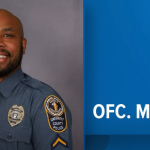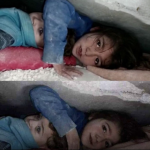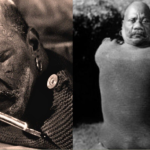✨💛 Deepak Paswan — A Boy Who Fought for the Right to Be Just a Child 💛✨
- SaoMai
- November 20, 2025
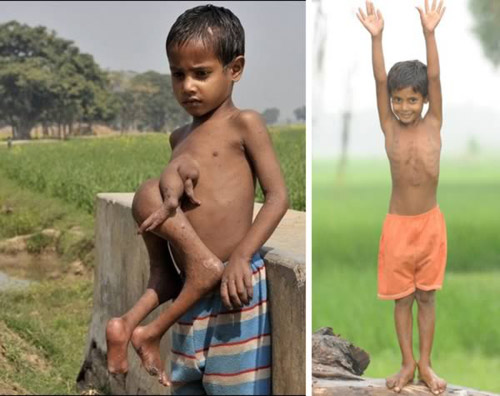
Deepak Paswan was born in a quiet village in Bihar with a condition that would change the course of his entire childhood — a parasitic twin that left him with eight limbs, four arms and four legs, attached to his tiny abdomen. In a place where miracles are woven into daily life, many villagers believed Deepak was the reincarnation of the god Vishnu. Pilgrims arrived at his doorstep, leaving offerings, kneeling in prayer, and treating him as a divine figure rather than a little boy. But while strangers saw him as holy, his family saw something far simpler and far more precious: a child who deserved a life free from superstition, free from stares, and free from being worshipped like an object. They longed for him to laugh, play, run, and dream — just like any other seven-year-old. Every day, Deepak’s parents worried for his future. They feared he would grow up isolated, defined by the extra limbs he never asked for. They feared he would never know what it meant to have a normal childhood. But despite the fear, they held onto hope — a quiet, persistent hope that one day their son might be seen not as a symbol, but simply as Deepak. That hope finally came to life when a hospital in Bangalore offered to perform a complex and expensive surgery for free. With courage, faith, and trembling hands, his family packed their few belongings and traveled across the country for the chance to rewrite their son’s destiny.
Every day, Deepak’s parents worried for his future. They feared he would grow up isolated, defined by the extra limbs he never asked for. They feared he would never know what it meant to have a normal childhood. But despite the fear, they held onto hope — a quiet, persistent hope that one day their son might be seen not as a symbol, but simply as Deepak. That hope finally came to life when a hospital in Bangalore offered to perform a complex and expensive surgery for free. With courage, faith, and trembling hands, his family packed their few belongings and traveled across the country for the chance to rewrite their son’s destiny.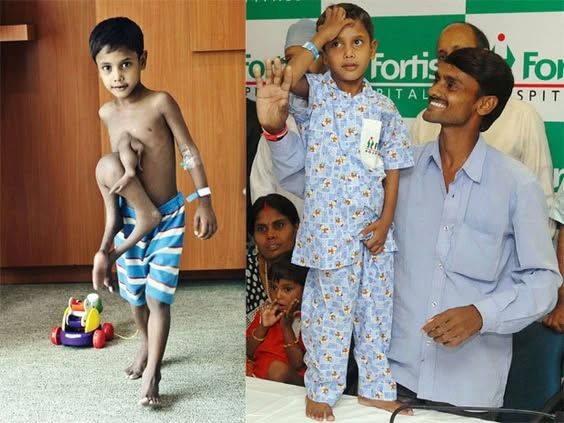 The surgery was long, delicate, and filled with risks. Doctors worked for hours to free Deepak from the limbs that had shaped how the world saw him. When the operation was finally declared a success, his father, Viresh Paswan, stood outside the hospital with tears in his eyes, whispering words he had held in his heart for years: “We always wanted our son to be just a boy, not treated as a religious object. Our dream has come true, and when we return home, we will celebrate this new life for him.”
The surgery was long, delicate, and filled with risks. Doctors worked for hours to free Deepak from the limbs that had shaped how the world saw him. When the operation was finally declared a success, his father, Viresh Paswan, stood outside the hospital with tears in his eyes, whispering words he had held in his heart for years: “We always wanted our son to be just a boy, not treated as a religious object. Our dream has come true, and when we return home, we will celebrate this new life for him.”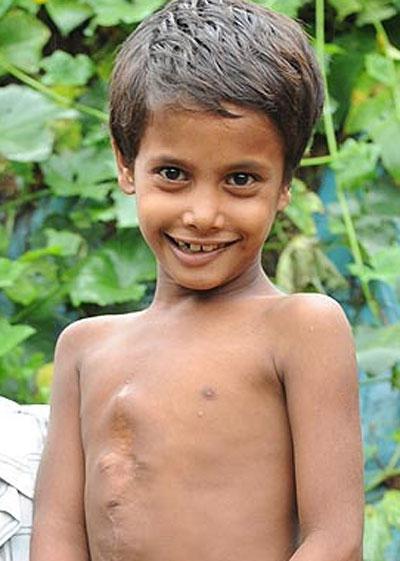 For the first time, Deepak was able to live as himself — a child, not a deity. No longer surrounded by worshippers, no longer bound by superstition, he was free to run, to play, to chase the world on his own terms. His laughter carried a new sound — freedom, joy, and the beginning of a childhood truly his own.
For the first time, Deepak was able to live as himself — a child, not a deity. No longer surrounded by worshippers, no longer bound by superstition, he was free to run, to play, to chase the world on his own terms. His laughter carried a new sound — freedom, joy, and the beginning of a childhood truly his own.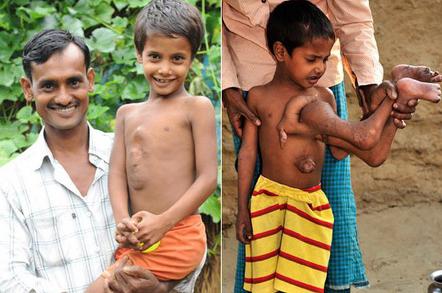 Deepak’s story isn’t just about a rare medical condition. It’s about the universal right of every child to be loved for who they are, not what others believe them to be. It’s a reminder that compassion, understanding, and courage can restore not only a body — but a life, a future, and a childhood filled with possibility. 💛✨
Deepak’s story isn’t just about a rare medical condition. It’s about the universal right of every child to be loved for who they are, not what others believe them to be. It’s a reminder that compassion, understanding, and courage can restore not only a body — but a life, a future, and a childhood filled with possibility. 💛✨
